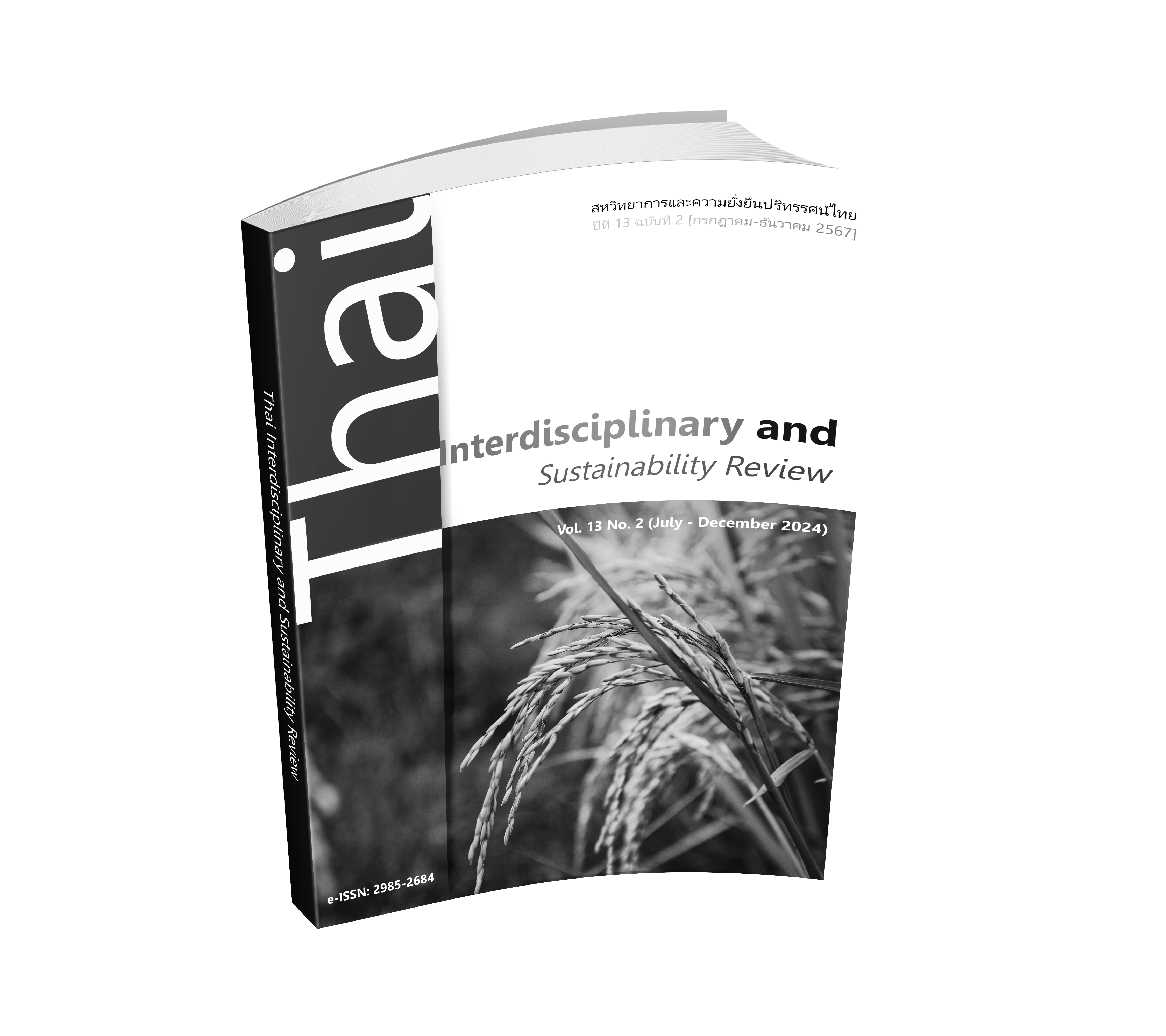FACTORS RELATED TO ENTREPRENEURIAL CHARACTERISTICS OF BACHELOR OF BUSINESS ADMINISTRATION STUDENTS IN BANGKOK
DOI:
https://doi.org/10.14456/tisr.2024.20Keywords:
Entrepreneurial Characteristics, Undergraduate Students, Business AdministrationAbstract
This research is quantitative research. The objective was to study factors related to entrepreneurial characteristics and to study the relationship between background factors and entrepreneurial characteristics of undergraduate business administration students in Bangkok. The sample used was 228 undergraduate business administration students in Bangkok using a multi-stage random sampling method. Using a measurement tool to evaluate 7 sets of variables, all measures had an alpha confidence coefficient between 0.74-0.82. The results of the research found that 1) the correlation coefficient between independent variables and entrepreneurial characteristics was between 0.317 and 0.829 and 2) The entrepreneurial trait prediction set was able to predict 60.34% of the total group, with the important predictors found in order being: need for success, self-confidence, tolerance for ambiguity, risk-taking, and self-control. In the end, the researcher proposed guidelines for developing entrepreneurial characteristics of undergraduate students for further application.
Downloads
References
ประจักษ์ ปฏิทัศน์. (2560). จิตวิทยาสำหรับผู้ประกอบการ. กรุงเทพฯ: ศูนย์ผลิตตำราเรียนและสิ่งพิมพ์ดิจิทัล มจพ.
พิบูล ทีปะปาล และ ธนวัฒน์ ทีปะปาล. (2552). การเป็นผู้ประกอบการ. กรุงเทพฯ: อมรการพิมพ์.
วัลลภา เทพหัสดิน ณ อยุธยา. (2556). การพัฒนานิสิตนักศึกษา. กรุงเทพฯ: จุฬาลงกรณ์มหาวิทยาลัย.
Ajzen, I. (2020). The theory of planned behavior: Frequently asked questions. Human Behavior and Emerging Technologies, 2(4), 314-324.
Audretsch, D. (2017). Entrepreneurship and Universities. International Journal of Entrepreneurship and Small Business, 31(1), 4-11.
Balan, P., & Lindsay, N. (2010). Innovation capability, entrepreneurial orientation and performance in Australian hotels: An empirical study. Queensland: Cooperative Research Centre for Sustainable Tourism.
Bosma, N., Content, J., Sanders, M., & Stam, E. (2018). Institutions, entrepreneurship, and economic growth in Europe. Small Business Economics, 51, 483-499.
Davidsson, P., Delmar, F., & Wiklund, J. (2017). Entrepreneurship as Growth: Growth as Entrepreneurship. In M. Hitt, R. Ireland, S. Camp, & D. Sexton. (eds.). Strategic Entrepreneurship: Creating a New Mindset (pp. 328-342). New Jersey: Blackwell Publishing Ltd.
Gartner, W. (2012). Entrepreneurship as organization creation. In Handbook of Organizational Entrepreneurship (pp. 21-30). Cheltenham: Edward Elgar Publishing.
Gedeon, S. (2010). What Is Entrepreneurship?. Entrepreneurial practice review, 1(3), 16-35.
Herron, L., & Robinson Jr., R. (1993). A structural model of the effects of entrepreneurial characteristics on venture performance. Journal of Business Venturing, 8(3), 281-294.
Hisrich, R., Peters, M., & Shepherd, D. (2020). Entrepreneurship. 11th ed. New York: McGraw-Hill Education.
Keat, O., Selvarajah, C., & Meyer, D. (2011). Inclination towards entrepreneurship among university students: An empirical study of Malaysian university students. International Journal of Business and Social Science, 2(4), 206-220.
Koh, D., Fung-Leung, W., Ho, A., Gray, D., Acha-Orbea, H., & Mak, T. (1992). Less mortality but more relapses in experimental allergic encephalomyelitis in CD8-/- mice. Science, 256(5060), 1210-1213.
Koh, H. (1996). Testing Hypotheses of Entrepreneurial Characteristics: A Study of Hong Kong MBA Students. Journal of Managerial Psychology, 11, 12-25.
Kuratko, D. (2005). The emergence of entrepreneurship education: Development, trends, and challenges. Entrepreneurship Theory and Practice, 29(5), 577-597.
Lumpkin, G., & Dess, G. (2001). Linking two dimensions of entrepreneurial orientation to firm performance: The moderating role of environment and industry life cycle. Journal of Business Venturing, 16(5), 429-451.
Miller, D., & Friesen, P. (1982). The longitudinal analysis of organizations: A methodological perspective. Management Science, 28(9), 1013-1034.
Nasierowski, W., & Arcelus, F. (2012). What is innovativeness: literature review. Foundations of Management, 4(1), 63-74.
Ngamcharoen, P. (2024). Entrepreneurs’ Characteristics That Impact Success in Organic Farming. Asian Administration and Management Review, 7(1), 13-24.
Rotter, J. (1966). Generalized expectancies for internal versus external control of reinforcement. Psychological Monographs: General and Applied, 80(1), 1-28.
Sakdapat, N. (2022). Analysis of the Path of influence of work skills in the new normal life of the undergraduate students in Thailand. Przestrzen Społeczna (Social Space), 22(3), 152-168.
Sakdapat, N. (2023). The Role of Psychological Factors and Situational Factors on the Financial Planning Behavior of Private Sector Employees in Thailand. International Journal of Economics and Finance Studies, 15(1), 449-465.
Sakdapat, N. (2024). Approaches for sustainable professional skill development for vocational education students in Thailand. F1000Research, 13, 401.
Schimperna, F., Nappo, F., & Marsigalia, B. (2021). Student Entrepreneurship in Universities: The State-of-the-Art. Administrative Sciences, 12(1), 5.
Zhao, Y. (2012). World Class Learners: Educating Creative and Entrepreneurial Students. California: Corwin Press.

Downloads
Published
How to Cite
Issue
Section
License
Copyright (c) 2024 Authors

This work is licensed under a Creative Commons Attribution-NonCommercial-NoDerivatives 4.0 International License.









.png)


